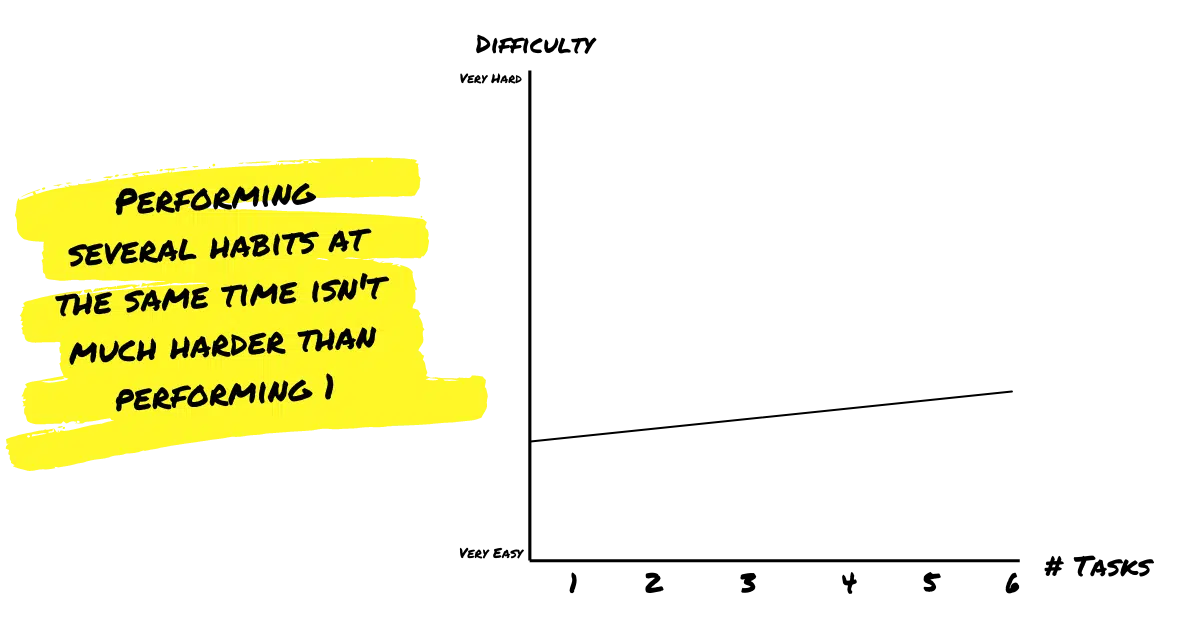Do you have 30 mins each day to invest in yourself? Can you move? Do you have a smartphone? If you answered yes to the above, this is for you.
I'm going to show you my daily mobile app based habit stack that helps me learn new things and keep myself as mentally sharp as possible (I need all the help I can get).
About Habit Stacks
Before I get into the actual habit stack, I want to briefly go over why habit stacks are so powerful. The power lies in the fact that making the time and effort to do something every day is the hard part and the tasks themselves are actually much easier.
If you can get started doing something, you can do several things at the same time and ride the momentum of your decision.

Basically, it's not much more difficult to do 6 little things in the same time frame as it is to remember to do just one.
My Habit Stack
I've played around with dozens of different apps and these are the ones that I now prefer.

The stack consists of 4 parts and I believe they each play a unique role in keeping my brain firing on all cylinders while also teaching me valuable skills in the process.
Walking
Since these are mobile apps, I get mobile with it! I put on my Airpod Pro's and do the app stack while walking at an average pace around my neighborhood.
Walking for 30 minutes isn't going to make you Michael Phelps, but the benefits of extended walking daily are tremendous.
30 minutes at 3mph (about the average walking speed) will get you through 1.5 miles in 30 minutes. Even better, I'm so focused on the apps that I don't notice any discomfort.

Average calories burnt per hour walking
I think tracking calories is vastly overrated though, so this is probably the least important benefit in why I choose to add walking to my stack.
There are several mental benefits that made me decide to add this to my stack. For instance, a University of Stanford study showed that walking could boost creative output by up to 60%. My bills are paid through creative output so I'll take any help I can get.
App #1 Blinkist for Listening to New Ideas from Popular Books
Blinkist is an amazing tool for anyone who wants to consume the 80/20 of any non-fiction book on the market. I think that people in our space spend too much time reading things that they already know.
While the summaries aren't always perfect or complete, they are very solid. I'm able to expose myself to the "cream of the crop" of ideas from the smartest people in the world quickly.
You can read or listen to blinks. I like to listen to them while I walk.
App #2 Duolingo for Foreign Language

How can you not love Duolingo? It is by far the easiest and most fun way to learn a foreign language.
Is it the best way? I can't say for sure, but it works and it's addicting.
I'm learning Mandarin Chinese in hopes of eventually doing more business overseas and traveling around Asia. At the rate I'm going, I anticipate it taking at least 5 years to feel fluent enough that I can navigate my way around the country without much help.
To keep myself motivated, I treat the process as a brain exercise and learning the language as a secondary benefit.
Studies show that learning a second language leads to an increase in our brain's grey matter and can even reduce the risks of developing Alzheimers disease as we age.
App #3 Mimo for Coding

Although I make a large amount of my income selling my own software, I have almost no coding skills.
Mimo makes learning how to code easy and their courses work extremely well on mobile devices (something I was concerned with when I considered using it).
Oh, just don't buy into the promotions for the Lambda coding program. They are under intense scrutiny for false claims about their student's success rates and job placement. Don't spend $30,000 on their program when you can learn how to code on your own...
App #4 Elevate for General Brain Training

Although the verdict is still out on whether or not brain training apps are truly as powerful as they're advertised, I find Elevate to be helpful.
I feel more fluid as a writer and speaker ever since I started using it. Is it a placebo effect? Perhaps somewhat, but the trainings inside of Elevate are very practical compared to some of the other similar programs that seem to try too hard to feel like games as opposed to teaching practical skills like grammar, spelling, writing and critical reading.
Building Your Stack
You're more than welcome to steal my app habit stack exactly as it is, but by no means feel like you can't make your own that is better for you.
I think everyone can benefit from Blinkist but the other apps might not be in your lane.
Instead of coding or foreign language, find another app that teaches you something else.
If you're a musician and want to improve your pitch, there's an app for that.
If you're trying to get better at remembering names, there's an app for that.
If you're trying to increase your vocabulary, there's an app for that.
Spend some time and build an app habit stack that you can stick with. Your future self will thank you!
Sources
- (Lambda lawsuit) https://techcrunch.com/2021/05/13/lambda-school-lawsuits/
- (2nd language and Alzheimers) https://www.annualreviews.org/doi/abs/10.1146/annurev-linguistics-011718-011820?journalCode=linguistics
- (Gray matter in bilinguals vs. monolinguals) https://knowablemagazine.org/article/mind/2018/how-second-language-can-boost-brainhttps://
- (Do brain training apps work?) https://patient.info/news-and-features/brain-training-apps-do-they-really-work#:~:text=%22At%20present%20there%20is%20little,lasting%20improvements%2C%22%20adds%20Brennan.
- (Health benefits of walking) https://www.nbcnews.com/better/health/why-walking-most-underrated-form-exercise-ncna797271
- (Calories burnt while walking) https://www.healthline.com/health/calories-burned-walking#calories-burned
- (Walking and creative output study) https://www.apa.org/pubs/journals/releases/xlm-a0036577.pdf



